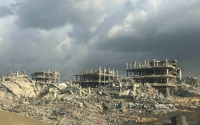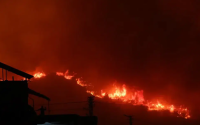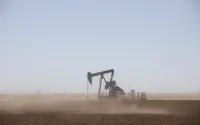19 January 2007Colin Brown
Two scientists who sat on a nuclear waste committee have alleged that chaotic organistaion drove the committee to approve an option for deep storage of high-level nuclear waste.
Labour MPs have responded to their allegations by saying there had been a " cover-up".
The scientists, Professor David Ball and Dr Keith Baverstock, left the Committee on Radioactive Waste Management (CoRWM) in April and May. David Miliband, the Secretary of State for the Environment, subsequently informed Labour MPs that Professor Ball had left for "personal reasons", an assertion dismissed by the professor as "misleading".
Professor Ball and Dr Baverstock accused Tony Blair of "manipulating" the committee's decision for "political ends". They believe its recommendation for deep storage of high-level waste was used to push through the Cabinet the decision to go ahead with a new generation of nuclear power stations.
But they warn that CoRWM's prolonged failure to identify which sites can safely take the waste will cause delays that could open Britain to a terrorist attack on its nuclear stockpiles, which are held on the surface at the Sellafield site in Cumbria.
"Science has been manipulated for political ends," said Dr Baverstock. "The time wasted has resulted in continued and unnecessary exposure of the public to the ongoing risk of temporarily stored nuclear waste, surely a legitimate public concern in this age of terrorism," said the scientists.
Dr Baverstock is a former senior radiation adviser with 12 years' experience at the World Health Organisation, but was sacked from the committee. He is now head of environmental science at the University of Kuopio, Finland.
Mr Miliband, in a letter to the Labour MP Alan Simpson, rejected their criticism, saying the committee had taken the "best available existing scientific knowledge" into account. He added: "I believe it is possible to conclude that the scientific basis for CoRWM's work has been sound."
Professor Ball said he had given Mr Miliband substantial reasons for his resignation from the committee, none of which could remotely be described as a "personal reason". He said: "I believed CoRWM to be treading dangerously close to the line and it was overall such an appalling experience that I concluded... that the only option was to resign." He added: "Defra's continuing strategy of total denial and what looks like the attempted rewriting of history is only compounding the problem."
The two scientists added that they were unaware that four of the CoRWM's 12 members worked for the committee's largest suppliers until it was revealed by The Independent on Sunday on 8 May 2005. The committee included a paid consultant for NNC, which won the £1m contract to project-manage CoRWM's work; an associate consultant for Enviros Consulting, which had a contract worth £50,000 to £100,000 from the committee; and an associate of the IDM consultancy, which conducted £10,000 to £50,000-worth of contract work for the committee. Mr Simpson, who organised a private Commons meeting with Labour MPs to hear the scientists' criticism, said: "This blows apart the recommendations for deep storage of nuclear waste.
The taxpayer faces an £85bn bill for disposing of the last generation of nuclear waste. We now know that no one has a clue how to do this safely. This is no time for a cover-up." He added: "Blair has been allowed to ride the country into another nuclear nightmare before he goes. Someone has to call a halt, and if Brown isn't up to it, he isn't up to the succession."
The Prime Minister signalled his determination on Tuesday to take the next step towards the nuclear power programme before he steps down from office. He announced that new licensing conditions for nuclear power stations would be published next month.
But a former Labour minister joined MPs in calling on Mr Blair to stop the development of nuclear power stations until he answers the concerns raised by the scientists. A former environment minister, Michael Meacher, said their views had to be considered by the Government rather than being " rubbished".
"I think it's very dangerous when reputable scientists have their views not fully taken into account and answered," said Mr Meacher. "It is incredibly irresponsible to go for a further round of nuclear power-station building when we still have not got a safe way of storing the huge volume of nuclear waste already produced."
Where the waste goes
* Higher activity radioactive waste is stored at facilities around the UK
* The amount is estimated at 80,000 cubic metres about the size of Albert Hall. It weighs about 100,000 tons
* Even if the Government decides not to build any more reactors, waste will increase by nearly sixfold to 477,860 cubic metres over the next century
* The Committee on Radioactive Waste Management was asked to look at all the options for higher activity waste and find a long-term solution
* It is expected to take 40 years to build a deep repository so, in the interim, it says the waste should be stored at surface sites as close as possible to nuclear facilities
* The most likely candidate is Sellafield.
http://news.independent.co.uk/uk/politics/article2165451.ece






